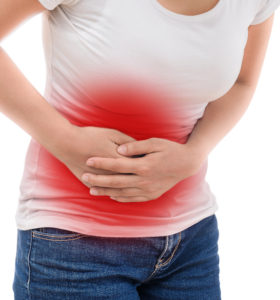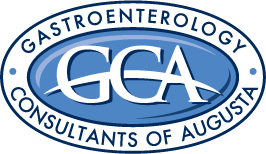Irritable Bowel Syndrome

Irritable Bowel Syndrome, known as IBS, is a common functional gut disorder characterized by abdominal pain and changes in bowel movements. The term functional disorder refers to the abnormal behavior of the intestines rather than the condition resulting from an injury or disease. According to the American College of Gastroenterology, as many as 15% of the global population experience IBS symptoms. Though there is no cure, most people can control their symptoms by managing diet, lifestyle and stress.
There are three main classifications of IBS:
- IBS-C: IBS with constipation
- IBS-D: IBS with diarrhea
- IBS-M: IBS with alternating constipation and diarrhea
Symptoms
IBS is characterized by the symptoms of
- Abdominal pain
- Cramping
- Bloating
- Gas
- Diarrhea
- Constipation
Causes
There is no clear known cause for IBS, although experts make the following observations
- Food intolerances are greater in patients with IBS. Research has not confirmed whether there is a causal effect between foods and IBS, but many patients report improved symptoms by eliminating certain foods.
- A number of IBS patients seem to experience abnormally strong contractions in their bowel. Not all patients experience these symptoms, suggesting that the contractions may not be the cause of the disorder.
- Some researchers propose that IBS may be caused by an altered bacterial environment in the colon, but studies do not yet conclusively support this claim.
- Other researchers speculate that those with IBS have an increased sensitivity in the nerves within the bowel causing normal digestion and gas that is not bothersome to others to be perceived as painful.
Statistics show that people under forty-five, and twice as many women than men are likely to have IBS.
Twice as many women suffer from IBS compared to men. IBS is rarely experienced as a new problem later in life.
Diagnosis
No single test can confirm whether you have IBS. Your doctor will diagnose by:
- Taking a medical history
- Performing a physical exam
- Performing diagnostic tests to rule out more serious conditions
Treatment
Some patients initially have symptoms so severe that their quality of life is significantly impacted. A number of individuals report an increased need to take time off from work or school, an inability to attend social engagements, travel or exercise, and a fear of engaging in sexual relations. Fortunately, there is hope for those affected by IBS to enjoy improvement in symptoms with help from your physician.
Most all patients can control their symptoms by managing diet, lifestyle and stress and avoiding their specific triggers. Various foods, medicines and even stress may trigger IBS symptoms. An important step in managing symptoms is to recognize what triggers affect you most.
Treatment will depend on your symptoms. Most all patients will experience improvement, but not everyone responds to the same treatment. It is important that you partner with your doctor to find what works best for you. Among the recommendations your doctor may make are
DIETARY
- Keeping a food journal to determine what foods you tolerate best
- Avoiding dairy products. Intolerance to lactose, the sugar found in milk products is seen in up to 40% of patients with IBS. For more information on lactose intolerance you can click HERE
- Avoiding foods that tend to cause gas, such as beans or green leafy vegetables
- Choosing easy to digest foods
- Increasing fiber
- Eating smaller meals
- Eating slower
- Seeking counseling if stress is a trigger
- Avoiding foods that are fried, fatty, spicy, acidic and contain nondigestible fiber
- Avoiding alcohol, caffeine and carbonated drinks
What can I eat with IBS?
What you can eat varies from person to person. Our practice has found that the foods listed below tend to cause the least problems overall for a patients.
| Protein | Lean beef & pork, poultry and fish prepared with little or no oil; Eggs |
| Vegetables | potatoes, boiled or baked; lettuce, cooked green beans, peas, carrots, celery, zucchini and sweet potato |
| Fruits | bananas, cantaloupe, citrus, raspberries and blueberries. Apples may be tolerated by some without skin or as applesauce |
| Cereals & Grains | breads, pasta, rice, oats, quinoa and crackers; plain cereals, such as cornflakes, Rice Krispies or Cheerios |
| Dairy and Alternatives | soy, almond or rice milk, lactose free yogurt, hard cheeses |
If you have IBS-D: You may benefit from a diet which focuses on low fiber foods.
If you have IBS-C: You may benefit from a diet which focuses on increased fiber.
FODMAP DIET
In studies at Monash University, Australian researchers Susan Shepherd and Peter Gibson found that 75-85% of IBS patients experienced significant, sustainable relief of IBS symptoms by following a low FODMAP diet. The acronym FODMAP stands for Fermentable Oligosaccharides, Disaccharides, Monosaccharides And Polyols. In short , these are small sugars like fructose, and sugar alcohols like xylose. In a low-FODMAP diet, foods containing certain sugars and fiber are avoided for a period of time and then re-introduced slowly to identify which are the offending foods. A number of our patients have benefitted from the low-FODMAP diet which can be found here.
MEDICATIONS
Some patients find that medications can provide relief from IBS symptoms. Common medicines your doctor may recommend or prescribe:
- Laxatives to relieve constipation
- Fiber supplements
- Diarrhea medications such a bismuth subsalicylate (Pepto-Bismol, Kaopectate) or loperamide (Immodium)
- Antidepressants, such as low doses of some tricyclic antidepressants and serotonin reuptake inhibitors. In addition to the effect these medicines have on patients who experience depression as a result of their symptoms, an additional benefit appears to be their ability to relieve those that predominantly suffer with diarrhea.
- Antispasmodics, such as hyoscine, cimetropium, and pinaverium, help to reduce pain in your abdomen by decreasing colon muscle spasms
- Lubiprostone (Amitiza) and Linaclotide (Linzess) helps improve constipation and abdominal pain in patients with IBS-C
- Antibiotics —Rrifaximin has been found decrease bloating and help symptoms in a some patients without constipation. More research is warranted before a treatment protocol includes antibiotics.
- Probiotics are live beneficial microorganisms that are similar to those found in our digestive system. A number of patients show improvement in IBS symptoms by taking probiotics regularly.
Fortunately, there are no known medical complications for those with IBS, however the disruptions caused by the chronic symptoms can be troublesome for patients.
Fortunately, there are no known medical complications for those with IBS, however the disruptions caused by the
chronic symptoms can be troublesome for patients. If you have IBS symptoms which have you concerned, our office
can help. Call (706) 868-0104 for more information.
The content on our website is for informational purposes only, and is not intended to diagnose or treat any medical conditions. Always seek the advice of your physician with any questions you may have regarding your health.
